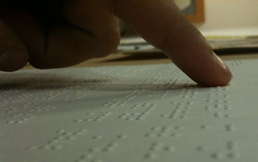Braille Brains
The same area of the brain is activated whether you’re a blind person reading Braille with your hands or a sighted person reading with your eyes.

The same area of the brain is activated whether you’re a blind person reading Braille with your hands or a sighted person reading with your eyes.

The surprising way the brain processes Braille, bilingualism staves off dementia, and new research on stuttering. Also: why being lonely could change how your immune system works, and the relationship between popularity and bullying.
Researchers are trying to predict which children will become persistent stutterers in order to provide them with needed speech therapy.
Speaking a second language may slow down the cognitive decline of Alzheimer’s disease.

ANNUAL MEETING SPECIAL: The new science of aeroecology, deconstructing taste preferences, new ways to store energy, and 3-D printers that could one day produce replacement organs.

BRAIN SCIENCE: How the brain chooses which memories to store during sleep, neural explanations for ringing in the ears, and the brain rewards of listening to music.
New discoveries in the Middle East suggest humans left Africa much earlier than previously thought.
A new study reflects an alarming lack of science literacy among U.S. college students.
Scientists have erased learning and memory deficits in a mouse model of early Alzheimer's disease.
Researchers are studying a woman who lacks fear in order to help those suffering from post-traumatic stress disorder.
NATURE OF INVENTION: Sea urchin teeth could inspire new nano-materials, and hornet stripes could lead to better solar technology. Also: automatic transmissions could revolutionize electric wheelchairs, and there's new research on the genetics of hair color and male pattern baldness.
Being born in the winter could affect your biological clock – and your personality – later in life.
People with more brain space devoted to vision are less easily fooled by an optical illusion.
Playing ancient Peruvian instruments inside the ruins of a temple gives researchers clues to the music's cultural significance.
Bacterial poison darts, a new approach to cancer research, turning skin into blood, depressing night-lights and the differences between human and Neanderthal brains.
